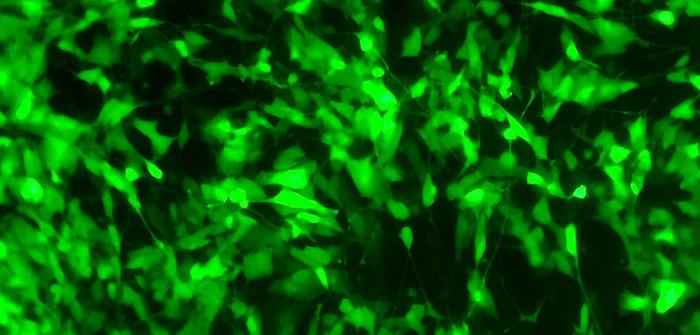Scientists at Scripps Research have made a breakthrough in the field of protease engineering that could potentially revolutionize treatment options for pervasive diseases including Parkinson’s and various cancers. The new study, published in the prestigious Proceedings of the National Academy of Sciences, focuses on the engineering of proteases—enzymes that cut proteins at specific sites—aiming to selectively degrade proteins that are notoriously hard to target due to their unstructured nature. This innovative approach manifests as a proof-of-concept for a broader therapeutic strategy that could be applied to numerous elusive protein targets throughout the human proteome.
In the realm of medical research, the challenges posed by intrinsically disordered proteins (IDPs), such as α-Synuclein, have stumped scientists for years. These proteins do not possess a stable, defined structure, making traditional drug design methods ineffective. Consequently, diseases like Parkinson’s, which involve the aggregation of α-Synuclein, have seen limited treatment options. The Scripps Research team successfully tackled this issue by reprogramming a protease derived from botulinum toxin, enhancing its specificity to exclusively target α-Synuclein without affecting other proteins.
The engineering work began with botulinum toxin, a protein with a well-known history as a neurotoxin often utilized in cosmetic procedures. Within this toxin lies an effective protease that traditionally cleaves only SNAP-25, a protein crucial for nerve signaling. The research team identified the potential to modify this protease to target α-Synuclein, thereby reconfiguring its functionality while retaining its ability to enter human cells.
Directed evolution emerged as the centerpiece of their methodology. By introducing mutations and selecting variants with heightened affinity for α-Synuclein through iterative rounds of modification, the scientists were able to produce a novel enzyme dubbed Protease 5. The directed evolution process is akin to selective breeding, where iterative refinement can lead a simple organism (or in this case, a protein) to develop enhanced and specialized traits. This meticulous process ensured that Protease 5 could degrade α-Synuclein efficiently, thus limiting the toxic aggregates implicated in neurodegenerative diseases.
One of the more striking aspects of this development is the care taken to ensure that the newly engineered protease was not only functional but also highly specific. Past attempts to evolve proteases for therapeutic use have often resulted in enzymes that indiscriminately cleaved numerous proteins. The Scripps team, however, successfully managed to fine-tune this enzyme to only recognize α-Synuclein. This specificity minimizes the risk of off-target effects that could otherwise lead to cellular toxicity.
Testing in human cellular models demonstrated that Protease 5 drastically reduced levels of α-Synuclein, suggesting that it has the potential to mitigate the dangerous protein accumulations frequently observed in Parkinson’s disease. Remarkably, early results indicate that this protease operates without inducing cellular toxicity, preserving essential functions within the cells while effectively targeting the unwanted protein.
Despite the promising nature of this research, the road toward viable clinical applications is still fraught with obstacles. One significant challenge lies in the delivery of Protease 5 to affected areas, specifically the brain. The blood-brain barrier poses a formidable hurdle for the transport of larger proteins, and strategies must be developed to navigate this limitation effectively. Additionally, researchers need to ensure that the modified enzyme does not provoke an immune response, complicating its therapeutic application.
Interestingly, the inherent properties of botulinum toxin lend themselves well to addressing these challenges. As a protein already known for its capacity to enter neurons and its historical tolerance by the immune system, it provides a unique foundation for engineering a therapeutic agent. Since the toxin is already in use in medical settings, it offers a promising avenue for the development of a modified enzyme aimed specifically at combating Parkinson’s disease.
The implications of this research extend beyond neurodegenerative diseases. The methodology developed could potentially be adapted for targeting proteins involved in various forms of cancer, thereby opening the door to new treatment strategies. The Scripps Research team is now exploring the application of their findings to target pivotal proteins like c-Myc and K-Ras, which are critically involved in tumorigenesis and progression.
The broader impact of this research cannot be overstated. By successfully engineering a protease that operates with extraordinary precision, the study not only provides hope for effective treatments against hard-to-target diseases but also lays the groundwork for a new generation of protease-based therapies. The potential to create a versatile platform for addressing a spectrum of protein-related diseases represents a significant leap forward in biomedical research, paving the way for additional innovations in targeted therapeutics.
The efforts to develop new methods for targeted protein degradation symbolize a paradigm shift in the approach to treating diseases that have long resisted traditional therapeutic interventions. By harnessing the principles of evolutionary biology and the capabilities of biochemical engineering, the Scripps Research team has taken a substantial step forward in redefining how we seek to manage complex diseases caused by misregulated proteins.
As this groundbreaking research continues to evolve, it will surely attract attention from both the scientific community and the media, underscoring the importance of continued support and investment in innovative biomedical research. With the exciting promise of improved treatment outcomes for some of humanity’s toughest health challenges on the horizon, the work of the Scripps Research team heralds a new chapter in the ongoing battle against disease.
In conclusion, the advancements made in engineering proteases represent not just a technical victory for researchers but also a beacon of hope for patients who have spent years waiting for effective therapies. As the Scripps Research team forges ahead, the convergence of science, technology, and health could lead to the emergence of solutions that fundamentally alter the landscape of modern medicine.
Subject of Research: Protease engineering and targeted degradation of proteins
Article Title: Targeted degradation of α-Synuclein using an evolved botulinum toxin protease
News Publication Date: March 24, 2025
Web References: Proceedings of the National Academy of Sciences
References: Not applicable
Image Credits: Credit: Scripps Research




